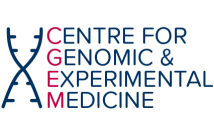EEF1A2 mutations in a human neurodevelopmental disorder
In a publication in the journal Human Molecular Genetics, Prof Cathy Abbott and her team describes a mouse model of a human neurodevelopmental disorder that can recapitulates a mutation seen in humans. March 2020

Mutations in a gene called EEF1A2 have been found, over the last few years, to be responsible for over a hundred cases of neurodevelopmental disorders in children. These disorders include often very severe forms of epilepsy along with intellectual disability and sometimes autism.
The EEF1A2 gene encodes an eEF1A translation elongation factor involved in delivery of tRNA to the ribosome. eEF1A translation elongation factors are required by all cells, in vertebrates they exist in one of two forms – eEF1A1 or eEF1A2. Neuronal and muscle (skeletal and cardiac) cells initially express the eEF1A1 form, however this is eventually entirely replaced by eEF1A2 in these cells.ified lead to these disorders by causing the gene simply not to work as well (“loss of function”) or by generating a toxic product (“gain of function”). It is very important to know which of these is the case before trying to address treatment.
In order both to address this question and to provide a novel model system for testing therapies, we used CRSIPR/Cas9 gene editing to recreate one of the disorder-causing mutations in mice along with a “null” mutation, a complete loss of function. Comparisons of these new mouse lines told us that the mutation seen in some of the children with neurodevelopmental disorders actually causes toxicity in nerve cells and muscle, suggesting that we should focus on ways of turning off the mutant protein.
“Mutations of EEF1A2 are rare but can have profound effects on patients’ lives. Our study is an important step towards the ultimate aim of providing clinical treatment strategies for people affected by EEF1A2 mutations.”
Links
Publication in journal Human Molecular Genetics https://doi.org/10.1093/hmg/ddaa042
Prof Cathy Abbott research group webpage


